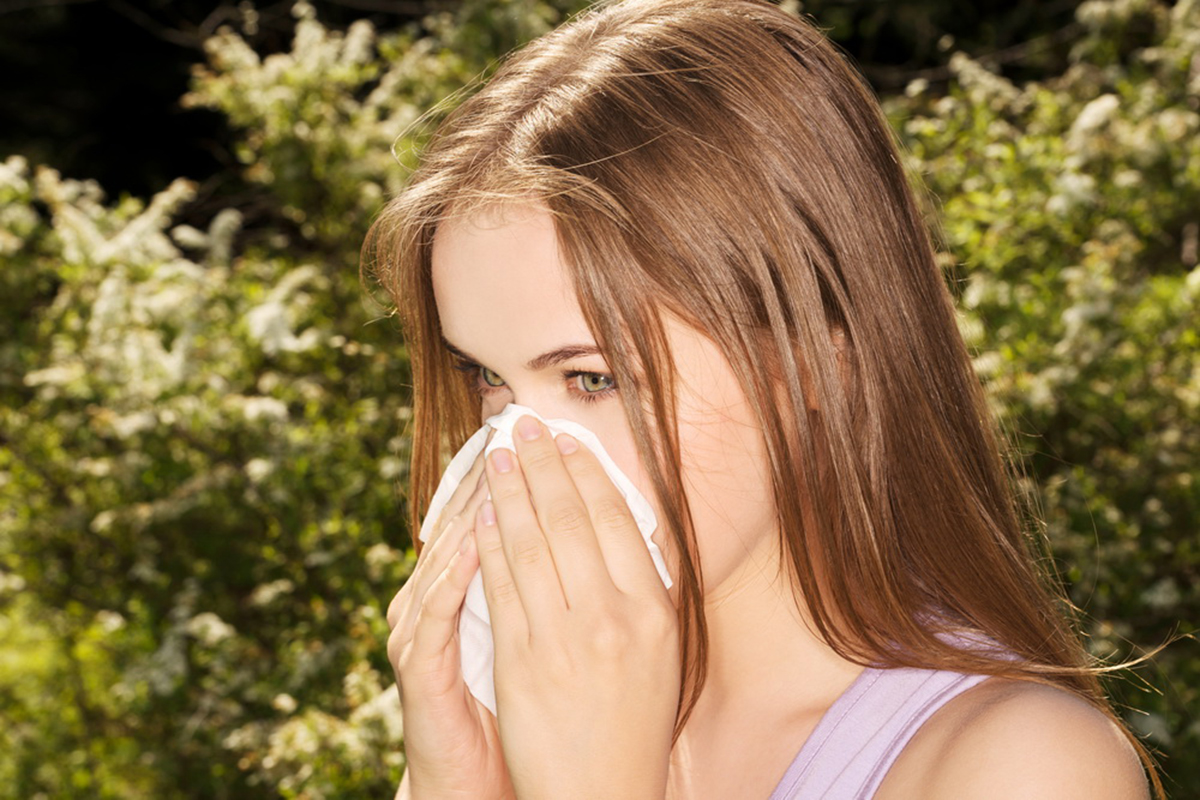Are you sniffling and sneezing? You might already be aware that you suffer from seasonal allergies. If you're not, don't write your symptoms off as a cold too quickly. Spring is, after all, the time during which trees and many plants begin to bloom and release pollen. This article will take a closer look at allergic rhinitis — usually called hay fever. Find out what the symptoms are, what you can do to feel better, and how you can find out whether you're allergic and what you are allergic to.

Seasonal Allergies: The Culprits
Pollen is one of the biggest allergens, and the cause of seasonal allergies. It's is a fine powder released into the air by trees and plants. Pollen is essential to a plants' reproductive system (call it "plant sperm"), but it can seriously mess with your immune system — which mistakes the pollen for germs, and triggers a stream of histamines and the accompanying nasty symptoms.
What are the most common offenders? There's actually a long list, and pollen can travel far and wide, making it harder to self-identify what is causing your problems. Tree-wise, you might have trouble with alder, ash, aspen, beech, box elder and ceder. Cottonwood, cypress, elm, hickory, juniper, maple, mulberry and oak are other potential problems. Then you have olive, palm, pine, poplar, sycamore and willow. Plants you might be allergic to include bermuda, fescue, johnson, june, orchard, perennial rye, redtop, saltgrass, sweet vernal, and timothy.
Having symptoms of seasonal allergies is quite enough to conclude that you're allergic to something, but you'll need allergy tests if you want to know exactly what you are allergic to.
Tell-Tale Signs You Are Allergic
The symptoms seasonal allergies might give you are often similar to those associated with a cold. How, then, do you tell the difference? An allergy will often give the patient a runny and stuffy nose, cause sneezing, and might result in a sore throat and a cough. Red and itchy eyes are common in people with allergies. They might also feel weak and fatigued.
A cold will cause a stuffy and runny nose as well, and sneezing is another symptom a cold has in common with a seasonal allergy. Coughing is more likely to appear in people with a cold than in those suffering from allergies, meanwhile.
See Also: Achooooooo: Inside The World Of Seasonal Allergies: A Dozen Tips For Sufferers
The big difference is that a cold can cause aches and pains all over the body, while allergy symptoms are more localized. Though a cold can occasionally lead to fevers, that just doesn't happen with allergies.
The duration of the symptoms offers another big clue. Do you think you "tend to come down with a cold in spring" a lot? You're more likely to be dealing with an allergy. A cold will pass after a few days to two weeks. Allergic symptoms can, on the other hand, persist for weeks — as long as the pollen season lasts.
Allergy Testing And Symptom Relief
Getting Seasonal Allergies Diagnosed
Have you noticed that you tend to get the symptoms associated with seasonal allergies during spring time, when pollen make their appearance? Allergy relief comes in many forms, and some people prefer to use natural treatments. Despite the fact that you may never need prescription medication, you could still benefit from being tested for allergies.

Seeing your family doctor is a good first step. After a discussion about your symptoms and medical history, you may be referred to an allergist. In an allergy skin test, your skin is scratched and tiny amounts of allergens placed on the scratch. The respective allergens are marked on your skin. Bumps will appear on your skin in reaction to the things you are allergic to.
Relieving Your Seasonal Allergies
Allergies can be treated with a wide variety of medications and home remedies. In most cases, you'll be able to get symptom relief with over-the-counter medication or natural remedies. Remember that it is always wise to talk to your doctor about the treatment you are using, even if this treatment does not require a prescription. You want to make sure that you use the best remedy for your allergies, after all.
You may use antihistamines to reduce your symptoms by lowering histamine levels in your body, and decongestants to clear your nose and reduce swelling. Nasal steroids, which reduce inflammation, usually require a prescription. Eye drops can be used to counter the itching and redness your allergies may be causing you.
See Also: Long-Acting Allergy Vaccines On The Way
Some people have luck with natural remedies. They include butterbur, nettles, goldenseal and even just a saline nasal spray. In many cases, you will simply want to experiment with different treatments in order to determine which ones do the best job of relieving your symptoms. Your doctor should always be a partner in the decision-making process, though — you'll want to ask which treatments you can safely combine, and ensure you stick to the right dosages.
Besides treatments that relieve your allergic symptoms, there are also some preventative steps you can take. Avoiding the things you are allergic to is the best prevention. Pollen spreads more easily on a windy day, so it can help to avoid going outside on such days. Closing your windows (and turning the air conditioning on instead, if you have to) will prevent allergens from making their way into your home. You may need to rid yourself of houseplants you are allergic to, and should remove any plants and trees that give you symptoms from your garden.
- Photo by shutterstock.com
- Photo courtesy of National Institutes of Health (NIH) by Wikimedia Commons : commons.wikimedia.org/wiki/File:Skin_prick_testing_for_allergies.jpg


Your thoughts on this